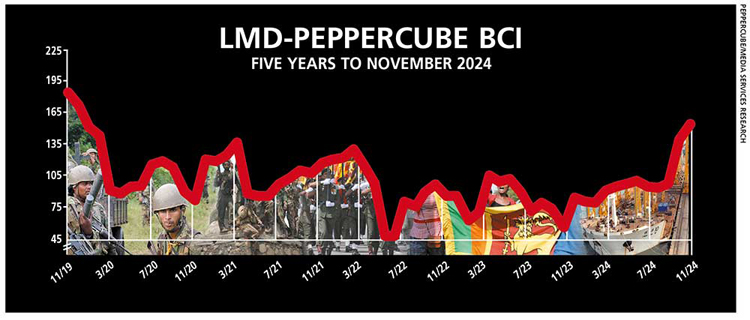December, 3, 2024

It is ironic that the index is now at a 59 month high – that was in January 2000 not long after the 2019 presidential election
Sri Lanka stands at yet another pivotal juncture as a new administration takes office in a country that has only just begun to recover from a debilitating economic crisis. In the meantime, the impact of the general election outcome on the business community remains uncertain with caution being the name of the game.
Corporates are likely eagerly awaiting the 2025 budget, which is to be unveiled in March next year.
For the time being, a four month interim vote on account is expected to be presented at the end of November. The newly elected president has pledged to reduce income tax in the upcoming budget – with a focus on lower income thresholds – while VAT on essential items could be removed in the near term.
Meanwhile, a crucial IMF staff level visit is anticipated towards the end of November – and President Anura Kumara Dissanayake expects the government to complete the third review of the International Monetary Fund’s Extended Fund Facility (EFF) by early February, perhaps ahead of Budget 2025.
He has also reportedly assured that the debt restructuring process will be completed by the end of this year.
THE INDEX In November, the LMD-PEPPERCUBE Business Confidence Index (BCI) shot up by 15 basis points to reach 154, from 139 in the month prior.
This is the highest point the index has reached in 2024 and the fourth month in which the barometer has crossed into triple digits this year – most recently last month, when the official rate of inflation entered negative territory.
Additionally, the index now stands 32 points above its historical median of 122 and is 52 notches higher than its 12 month average of 102. What’s more, the BCI stood at a lowly 58 basis points only a year ago.
PepperCube Consultants notes that long-term optimism regarding the economy and sales volumes has seen a slight improvement following the boost in October.
However, it says that concerns over potential administrative or regulatory barriers introduced by the caretaker government – along with uncertainty about the outcome of the general election at the time of the survey, in the first week of November – are the primary reasons for increased caution around political interference in business activities.
SENSITIVITIES How corporates view the general election outcome and expectations surrounding Budget 2025 are at the top of the list of sensitivities.
We will know the answer to the former when the next edition of the BCI is released in LMD’s January issue. As for the latter, the business community may well have to ‘wait and see’ whether the promises made over two elections are likely to be kept.
On the external front, the raging wars in the Middle East and Ukraine do not bode well for global economic stability while the impact of US President-elect Donald Trump’s second term remains to be seen.
PROJECTIONS So it remains to be seen whether the post-presidential poll confidence will carry over in the aftermath of the 14 November general election.
Therefore, this is not a month that is conducive to playing the guessing game!
Video Story